Intel Core i9-9980XE CPU Review: Still Too Expensive
Why you can trust Tom's Hardware
VRMark, 3DMark, AotS: Escalation and Dawn of War III
We tested the Ryzen Threadripper processors in Game Mode, per AMD's suggestion, halving (or quartering) the available execution cores. Company representatives tell us this facilitates optimal performance in games. Any mention of PBO in the charts indicates that we used AMD’s Precision Boost Overdrive, an automatic overclocking feature that wrings out maximum performance based upon our platform's power delivery and cooling capabilities.
Gaming performance is measured at 1920x1080, minimizing graphics bottlenecks. Naturally, as you step up to higher resolutions, the differences between processors shrink.
VRMark, 3DMark
We aren't big fans of using synthetic benchmarks to measure performance, but 3DMark's DX11 and DX12 CPU tests provide useful insight into the amount of horsepower available to game engines.
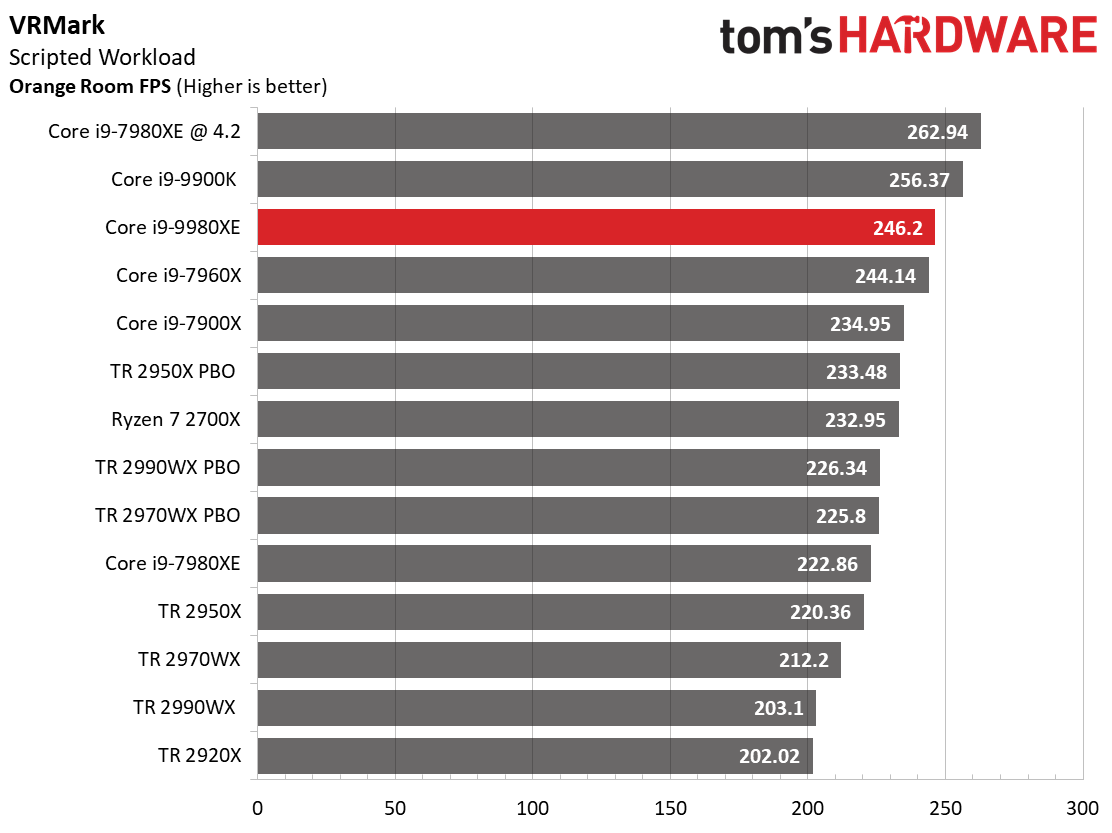
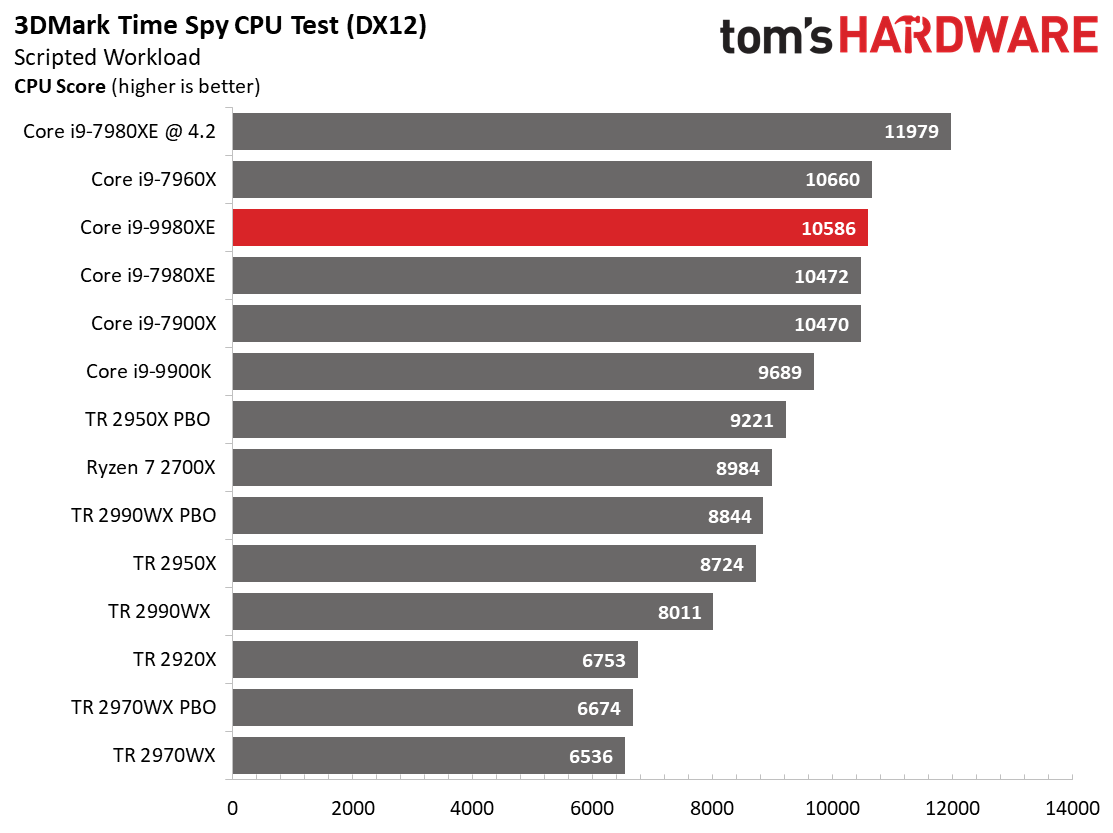
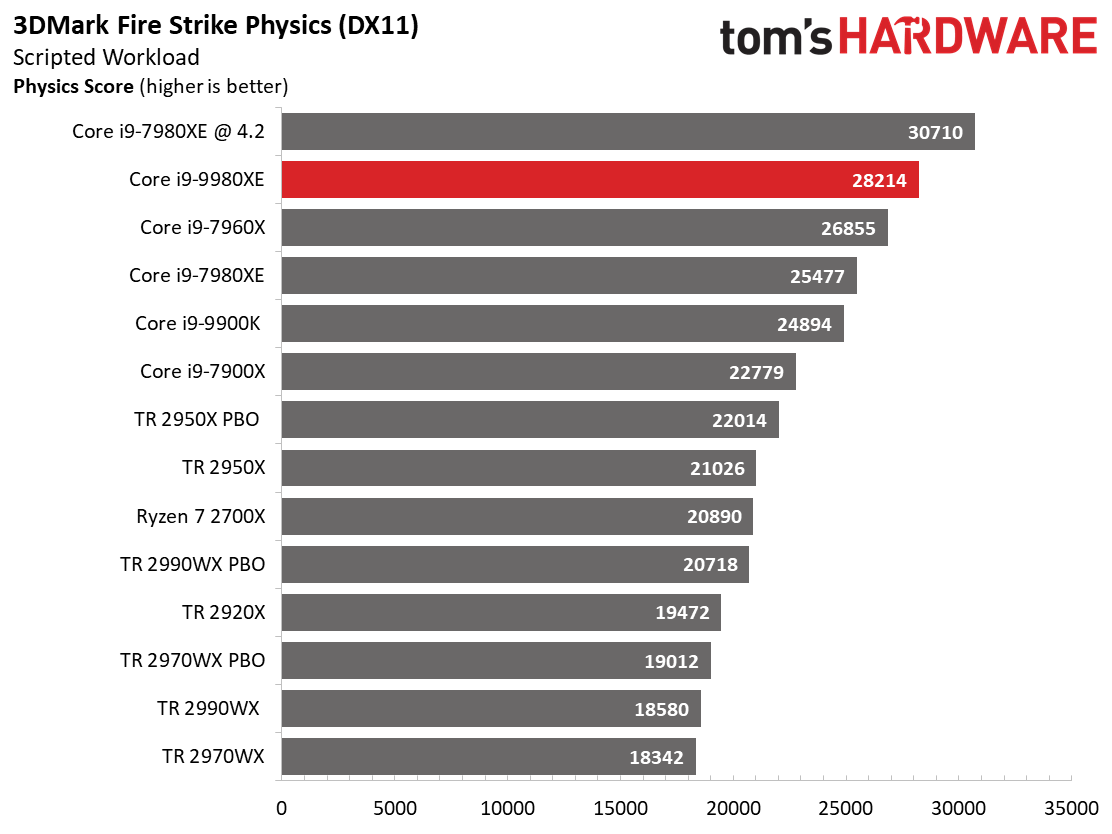
The 18C/36T Core i9-9980XE fares well at its stock settings. But given the Core i9-7960X's position just behind, it's clear that these tests don't scale linearly based on core count.
AMD's Ryzen Threadripper chips land quite a ways down our charts. With that said, we did test in AMD's recommended Game Mode.
Intel’s processors take the lead in VRMark, largely due to their impressive per-core (a mixture of frequency and IPC) performance. The Core i9-9980XE benefits from a slightly higher single-core 4.5 GHz Turbo Boost 3.0 frequency compared to the -7980XE, which tops out at 4.4 GHz.
Ashes of the Singularity: Escalation
Ashes of the Singularity: Escalation is a computationally intense title that normally scales well with thread count.
Get Tom's Hardware's best news and in-depth reviews, straight to your inbox.
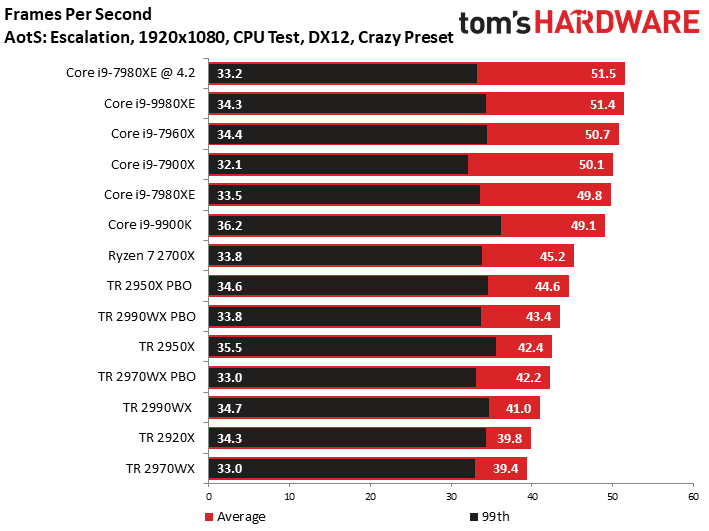
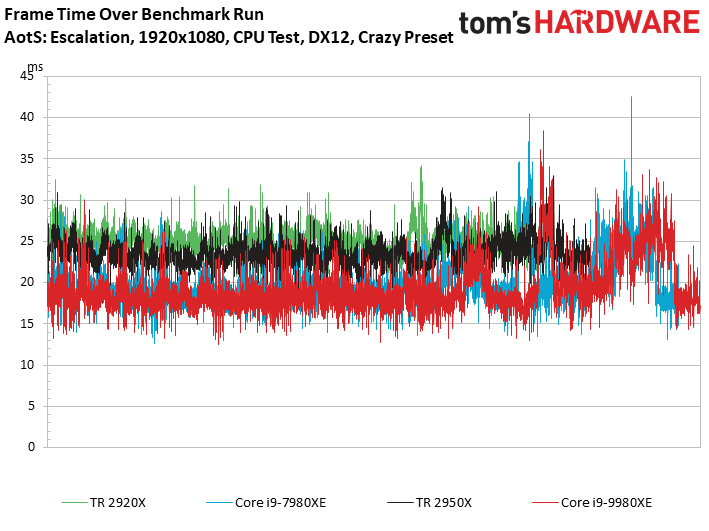
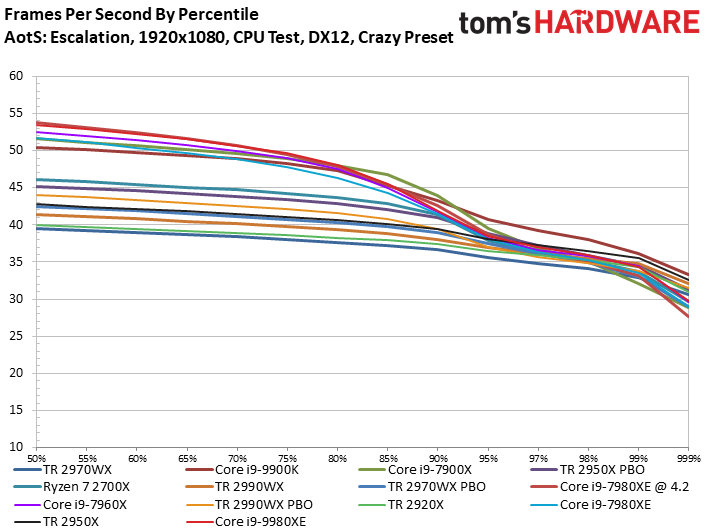
Core i9-9980XE takes the lead in our Ashes of the Singularity: Escalation benchmark, though we only recorded an average 0.6 FPS gain over the Core i9-7980XE. The -9980XE also posts similar frame time percentiles, suggesting that the bumped-up frequency provides little real-world advantage in this title.
Warhammer 40,000: Dawn of War III
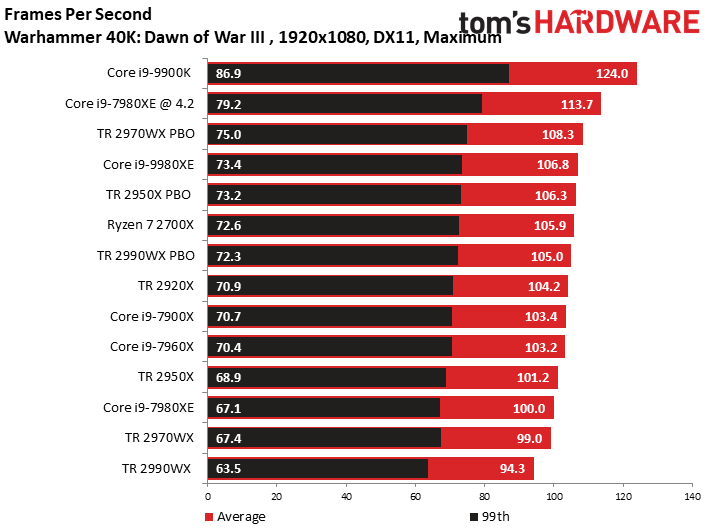
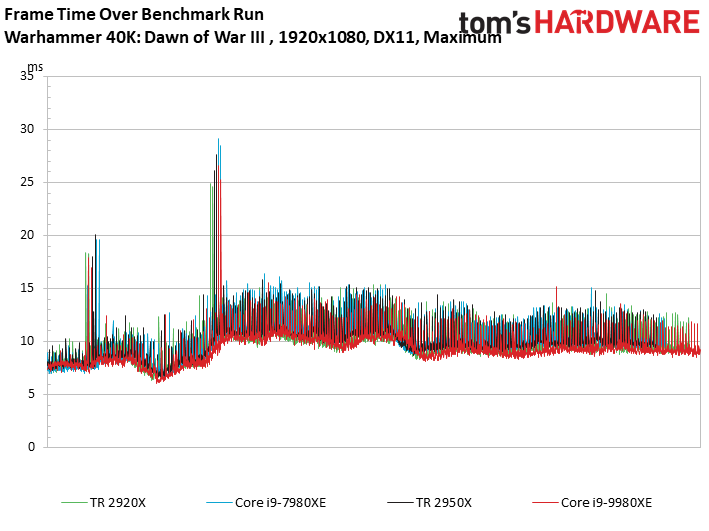
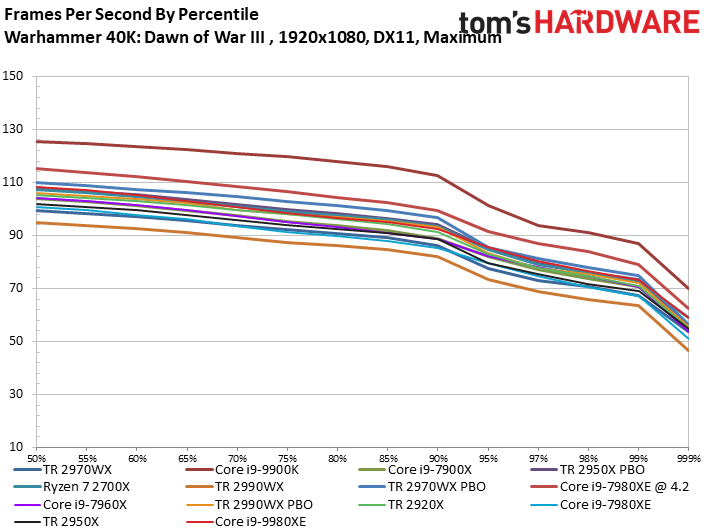
The Intel Core i9-9900K takes a commanding lead, while AMD's Ryzen Threadripper 2970WX with PBO active is competitive with competing high-end desktop CPUs.
Meanwhile, the -9980XE scores a 6.8 percent gain compared to its predecessor, the -7980XE. That outcome isn't surprising given this title's heavily-threaded nature.
MORE: Best CPUs
MORE: Intel & AMD Processor Hierarchy
MORE: All CPUs Content
Current page: VRMark, 3DMark, AotS: Escalation and Dawn of War III
Prev Page Power, Overclocking and Test Setup Next Page Far Cry 5, GTA: V and Hitman
Paul Alcorn is the Editor-in-Chief for Tom's Hardware US. He also writes news and reviews on CPUs, storage, and enterprise hardware.
-
lperreault21 so double the price per core with less than half the cores as the AMD equivalent, all within spitting distance in terms of performance, for a significantly more money, and no upgrade path on the socket (most likely) and a 4/5 ... wtf tomsReply -
rs.anantmishra AMD's Ryzen Threadripper chips land quite a ways down our charts. With that said, we did test in AMD's recommended Game Mode.Reply
Does this turn off many of the TR's cores? If yes, then these benchmarks are no good right? -
rs.anantmishra Also, why the hell this dude has included gaming benchmarks? This guy himself says that these are not gaming CPU's and then goes ahead and makes 3 of the 5 benchmark pages about gaming!!!!Reply
That's just super weird man! Are you sure what you're talking about??? -
velocityg4 I'm curious as to why Adobe Premiere was not included in the Adobe tests? Premiere is one of the few Adobe programs which benefits from heavy multi-core performance. Photoshop, Illustrator and After Effects are still mostly focused on one to a few cores.Reply
-
pct8750 Hi, Paul!Reply
Did Intel officially announce Skylake-X Refresh be manufactured on 14++ node?
9980XE Stepping is the same as 7980XE.
Stepping is 4, there is no change. -
Kaz_2_ Biased whole tome article dedicate to intel. This should be rated 2/5 like linus tech has saidReply